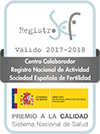Legal aspects about In Vitro Fertilization with Egg donation
Infertility is a chronic disease that makes it impossible for the woman to get pregnant. Nevertheless, thanks to assisted reproduction there are different treatments and techniques to achieve the pregnancy. One of these is the IVF with egg donation which consists of using the eggs from a donor with a sperm sample, the fertilization process is carried on and the embryo is placed to the recipient woman’s uterus affected by fertility issues.
Law 14/2006 on Assisted reproduction techniques establishes that the donation must be performed in altruistic, voluntarily and anonymous way. Below, there is a detailed explanation about aspects related to the In Vitro Fertilization with egg donation law:
- Legally, the recipient has the right to have access to egg donors but with no prior selection. The Assisted Reproduction specialists are in charge of selecting donors according to similar physical characteristics (phenotype) between the recipient and the donor.
- The donation is anonymous. Although the recipients do have the right to receive information about the donor, they will never know their identity. The gametes banks must be strict with the confidentiality piece.
- As required by law, donors must be over 18 years of age and have both a good physical and psychological health condition. In fact they must undergo several medical examinations.
- The same law contemplates the right of filiation for the children born through egg donation, i.e the newborn will legally belong to the woman who carried on the pregnancy and her partner (if required).
- Another requirement for the donor is that she has not given birth to more than six children, and if the fact she has never been a mother is positively considered.
- Under this legislation, the donation will not be commercial or lucrative but an altruistic act. However, the National Commission for Assisted Reproduction provides a financial compensation for the donor who will receive it because of the physical discomfort and the time spent while being subjected to the procedure.
- Surrogacy, also known as surrogate mother is forbidden in Spain.
Moreover, several consents must be signed to undergo IVF with egg donation. These documents belong to the communication process between the medical team and the patients who accept to be subjected to assisted reproductive treatments performed by the specialists.
In which cases is the Egg donation consent signed?
When the recipient patient is married, her husband is required to sign the consent too. On the other hand, the donor must sign the informed consent stating that it satisfies the free use of donated oocytes. Also the recipient will sign the consent where she accepts to be subjected to the technique and she may decide to suspend the procedure at any time before the embryo transfer.








